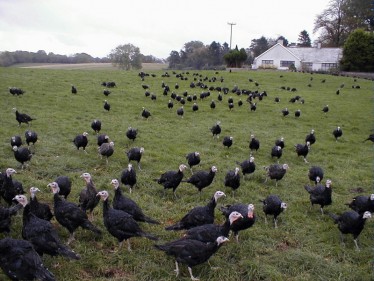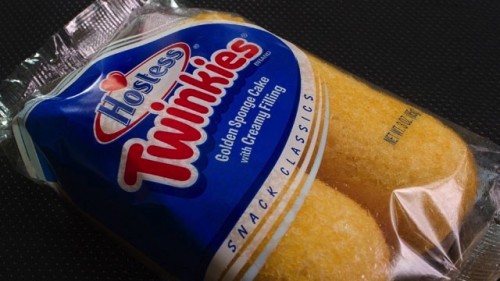
(Free range turkeys in the field. I can’t tell from this angle which one is #5.)
Number Five is the name Meg Campbell of Croftburn Farms attached to the bird that was purchased several weeks ago by the enormous person in overalls in line ahead of me. I was getting eggs and cheese, as is customary on the way down to Refuge Farm.
Croftburn Market is the family outlet that Meg’s son Andrew opened this year on Braggs Corner Road Bradford Road, just off Route 29. I was standing in a line of jumbo-sized customers, apparently picking up their Thanksgiving turkeys.
The mission statement of the Campbell clan is “to provide good, healthy food at a price that people can afford.” That would be on the high side of the sprawling Martin’s mega-market up the road, but worth it to support local food.
The large man in front of me gave his name to Meg at the register, and she called out to Andrew that #5 was there. It was an impressive bird, from what I would see of it peeking out of the white plastic bag.
The transaction was pre-paid, and I set the eggs on the counter as the man carried the bird away. “When was that turkey executed?” I asked. I made sure I smiled as I said it, to ensure that she knew I was not disapproving. “I was just wondering,” I said. “#5 was my number in land survival school in Warner Springs, California. They took away our names and gave us numbers for the simulated POW camp.”
“This Number Five was never in confinement,” she said, brushing a lock of dark hair back over her ear. “In fact, Croftburn Farm operates on a free range model, and I am confident that right up to the moment of his death, #5 was at least as happy as I am and possibly more. “
Croftburn would never sell a Twinky, for the record, not that there is going to be a lot of that going on since the Hostess company decided to throw in the towel.
Or the Ho Ho, which also died this week, and even the venerable Wonder Bread. That reminded me about bread, and I asked Meg to add one of the crisp baguettes to my tab.
Our relationship with food is an interesting thing. While the Twinky may have been invented in the 1930s (I suspect some are still around and as edible now as then) Meg says the hidden costs of cheap food results directly in lost flavor and health impacts.
“Everybody should be entitled to high quality food at a fair price,” she said, ringing up the eggs and cheese. “And they should have access to local food, so there is more of a connection between the farm and the producer and the consumer.”
It is a totally different sort of thing than the eternal Twinky. There is a lot of negative PR about how the union killed the Twinky, but it would be as fair to blame the protectionist policy on American sugar that artificially kept the price of ingredients high.
I can’t do a treatise on sugar this morning. I try to stay away form the stuff, and do not believe I have had a Twinky since the kids were little. The crisis came after the Teamsters came to the table and agreed to concessions. In final tense negotiations with the other major player, the Bakery, Confectionery, Tobacco Workers and Grain Millers International Union (BCTGM) the union dug in its heels and stayed on the picket line.
Hostess management quit, and decided to fire-sale the assets of the enterprise. That will result in the lay-off of nearly 19,000 workers and the closure of 33 bakeries, 565 distribution centers, approximately 5,500 delivery routes and 570 outlet stores across the country.
Times have changed, and I don’t mind the loss of the gaily-decorated plastic wrappers of the Wonder Bread. That stuff was indeed a wonder. It had no taste that I can recall. We used to buy the long square loaves of spongy white bread and smoosh them flat so we could carry them more efficiently in our back-backs for hiking in the Uintas Primitive Area. You could then peel off a slice no thicker than the piece of cheese or bologna to make an efficient sandwich.
Not particularly nutritious, but certainly efficient.

(The famous Burning Bush at Refuge Farm, Thanksgiving week 2012. Photo Socotra.)
But anyway, when Dad got eased out of his job as CEO of Grand Rapids Manufacturing (he was too expensive), he was not ready to retire and wound up purchasing one of the firms that subcontracted the wire racks for the ovens his old company had produced under the Kelvinator (and other) brand names. Curtis Wire was the name of the concern, and it was located Up North, in Petoskey.
It being Michigan, the little manufacturing shop was organized by the UAW. Times being what they were in the early 1980s, jobs were migrating not overseas, but down south to non-union shops. People in Tennessee were happy to get the work, and Dad was finally in a position that he had to sit down with the Union guys and give it to them straight: either there would be wage concessions or the plant would close.
The UAW decided to commit seppuku and refused.
Dad closed the plant, reluctantly but finally and the jobs left town for good.
“A view of the Bay and half the pay,” went the old rhyme, and that is the way the jobs left Tennessee, too, when the time came, to migrate to Vietnam.
Me? I guess I am migrating to Culpeper. The eggs are better, for one thing, and a strong local food movement helps to keep the landscape bucolic and pleasant. I thanked Meg for her service to the community and she nodded. “Thanks for supporting local food. People need to invest in buying local, so we local farmers can stay here and continue to work the land, and share in the pleasure of living in a rural place.”
I did not think that #5 would necessarily agree, but his quality of life was probably a lot better than it could have been, and I hope that family that bought him cooks him well.
I got a note this morning just at press time that suggests a Mexican firm is interested in buying the Hostess brands. I am sure it will make it all much more affordable. Happy Thanksgiving.

Copyright 2012 Vic Socotra
www.vicsocotra.com
